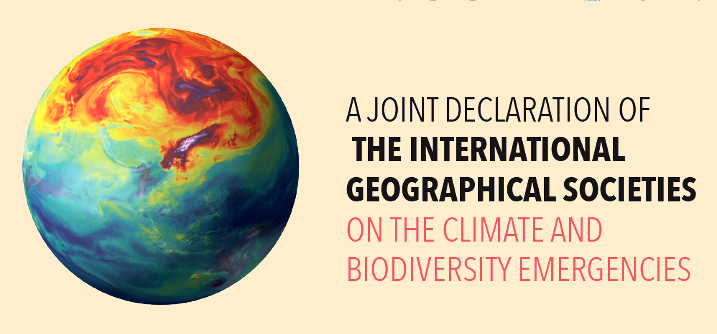Déclaration, publiée en vue de l’ouverture de la 26e Conférence des Parties (COP 26 à Glasgow), approuvée par 80 organisations représentant 59 pays, rédigée pour souligner l’importance de notre discipline pour relever les principaux défis mondiaux, notamment l’urgence climatique et la crise de la biodiversité
Voir le document original
« Geographers have UNIQUE OPPORTUNITIES AND RESPONSIBILITIES in the face of the global biodiversity and climate crises. Geography is a discipline that is uniquely located at the intersection of the social sciences, natural sciences, and humanities. This equips geographers to be adept systems-thinkers and interdisciplinarians. It is furthermore an applied knowledge, focused above all on the state of our planet and our relationships with it. All of this makes the learning, teaching, and practice of geography centrally relevant to the closely-linked challenges of the global climate and biodiversity crises.
Geographers can do much more than present an analysis of these challenges. They also have a vantage point from which they can point to the kinds of thought and action that can deliver a better tomorrow for every person on Earth.
This coming October and November will see some of the most consequential weeks in terms of humanity’s collective relationship with planet Earth. In October the world’s governments will come together to confront the continuing dramatic loss of species and their habitats—the biodiversity crisis—compounded as it is by the accumulating impacts of climate change. It is hoped that the meeting will set the stage for ambitious new targets for the global conservation of nature out to 2030.
Around the same time, in Milan, Italy, and then, for two weeks in November, in Glasgow, Scotland, governments will reconvene to confront the existential challenge of climate change. It is widely hoped and expected that the meeting will set enhanced and more urgent reduction targets for greenhouse gas emissions out to 2030, as well as mandating a critical role for nature in climate change mitigation and adaption.
Geographers, whether as students, researchers, educators, writers, explorers, practitioners in business or policy, or as engaged and curious travellers, encourage our leaders to make ambitious commitments to place the protection of nature and a liveable climate at the centre of the world’s economics and politics at this critical juncture.
Accordingly, we pledge that our institutions will redouble our efforts to apply the unique attributes that are the hallmark of the learning, teaching, and practice of geography to the global environmental challenges that have drawn together the world’s governments to these vital meetings this year. We commit to doing all that we can to apply geography’s potent capabilities to the task of making the coming decade one of hope and of positive action. »


